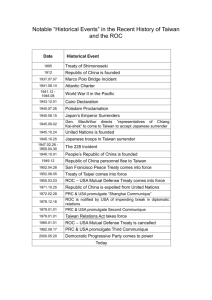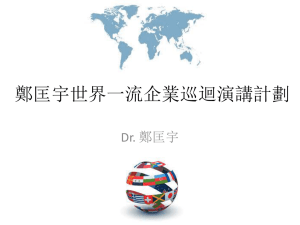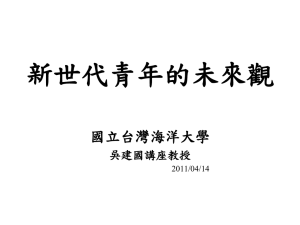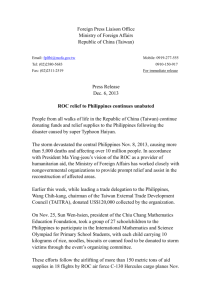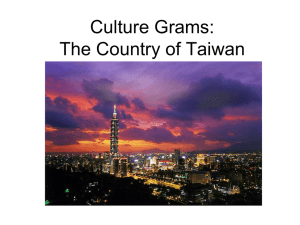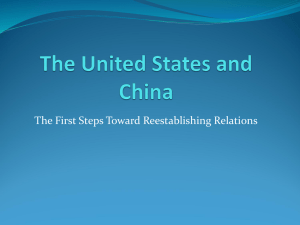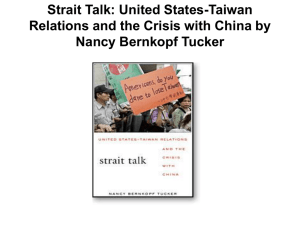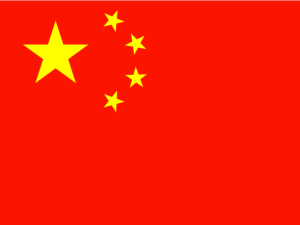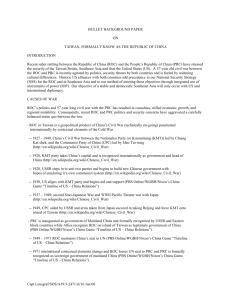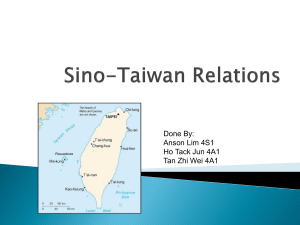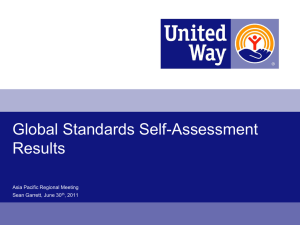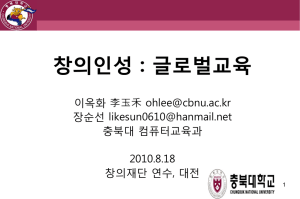The Taiwan/China Split
advertisement
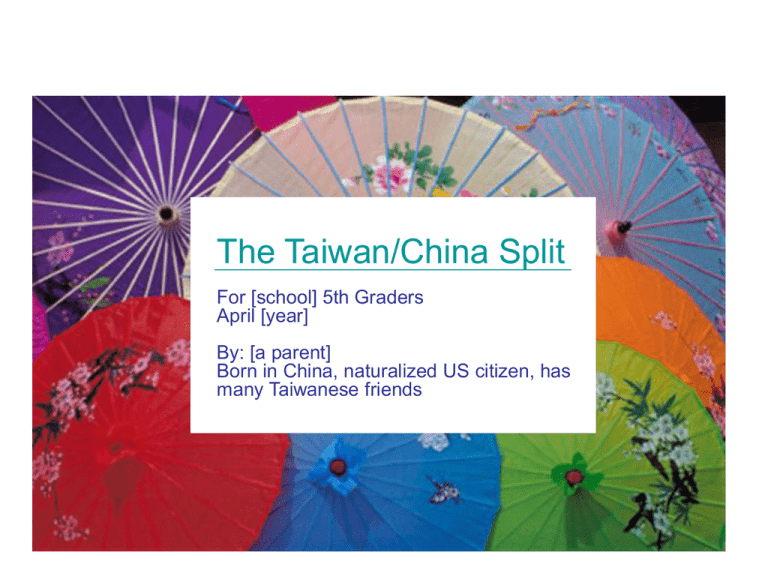
The Taiwan/China Split For [school] 5th Graders April [year] By: [a parent] Born in China, naturalized US citizen, has many Taiwanese friends Index 1. How did the "split" happen? 2. Why do Taiwanese feel they should be recognized as their own country? 3. Why does China believe that Taiwan should remain part of China? 4. The pain felt by families as a result 5. What is it like today? How will it be in the future? Some Facts • “PRC” - People’s Republic of China, established in 1949, with capital in Beijing. • Commonly known as “China” • One party rule – The Communist Party of China • “ROC” - Republic of China, established in 1912 • Commonly known as “Taiwan” • Democratic political system: Party currently in office - Nationalist Party Major opponent - Democratic Progressive Party Map of China ROC Official Map •The ROC continues to claim sovereignty over all China, which the ROC defines to include mainland China, Taiwan, Outer Mongolia and other areas. China Mainland Great QING Dynasty 1895 World War II ROC Comm Party established, and KMT Communist joined Capital Party Nanjing established forces QING in China Fight the Dynasty Japanese toppled, together 1912 Qing Dynasty lost the 1st Sino-Japanese War Taiwan Island 1920 Surrender of Japan – end of WWII Chinese Civil War Began 1937-1945 1945 Taiwan under 50 years of Japanese Rule Japan returned Taiwan to the ROC PLA Army & Communist Party won Civil War PRC established 1949 KMT lost Civil War, ROC retreated from Nanjing to Taipei Important People and Terms PRC 1949 (Mao?) and the People’s Liberation Army (PLA) won the Civil War. “We are the sole representative of China, including Taiwan.” PRC said… ROC 1949 Chiang Kai-shek led the Kuomintang (KMT) party, intellectuals, and business elites to Taiwan. “We just moved to China temporarily. We’ll move back and re-establish ourselves as leaders.” ROC said… Why do Taiwanese feel they should be recognized as their own country? • ROC thinks they just “moved” to Taiwan in 1949 temporarily, and will eventually go back to take over mainland China. • 1960s and 1970s, Taiwan developed into a prosperous, industrialized and developed region with a strong and dynamic economy. • Until 1970, most Western nations and the United Nations regarded the ROC as the sole legitimate government of China. • In 1971, ROC lost its seat at the United Nations to the PRC. Since then, many nations began switching diplomatic recognition of China from Taipei to Beijing following in the lead of the ROC's one-time major ally, the United States, after President Nixon visited PRC for the first time. What’s the impact on people? • The 2 million people that left China during and after 1949, how many families were split? Some never went back to China for 60 years. • Until the 1970s, the two sides were “enemies”, people who went to the other side were called “defectors”. » One most famous “defector” today is the Chief Economist of the World Bank, Justin Lin Yifu. » Mr. Lin was a captain in the Republic Army when he “defected” from Taiwan to China in 1979. In China, he got his MBA from Beijing University, and went on to get his PhD in Economics from the University of Chicago. » Today, Taiwan still does not allow him to go back, even just to pay respect to his dead father. PRC’s “One China” Policy • Since the 1990s, there has a been a gradual shift towards referring to the ROC as "Taiwan" due to the PRC's One-China policy of diplomatically isolating the ROC from the international community. • The Taiwan independence movement on the island has raised a political status issue, and the party lost its rule. • The PRC claims Taiwan is one of its provinces that must be reunited with the mainland and threatens military invasion if Taiwan island declares independence. • The Communist Party is still the ruling party of PRC China today, now the 2nd largest economy of the world. What’s it like today? • Things are getting better for the people to travel and do business between the two sides. • Today, Taiwanese business people are free to enter China and set up factories (under some supervision). In fact, there are many Taiwanese people living in China. But Chinese people are not yet doing much business in Taiwan yet. • Taiwanese tourists are allowed to visit China. Recently, Chinese tourists are also allowed to visit Taiwan, but only in groups. • Direct flights between the two sides were only started in 2009. Before that, all flights had to go through HK. • But, the political dispute is still there, and military tension is still high. What Will It Be Tomorrow? • Let’s hope for a peaceful solution for the people of Taiwan and China! • Many have suffered during all these years. Let’s hope that they suffer no more!
